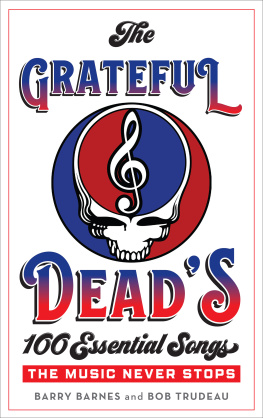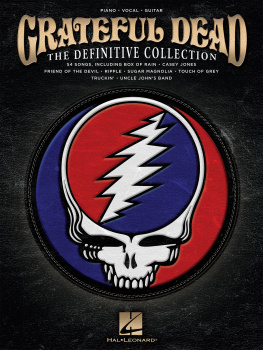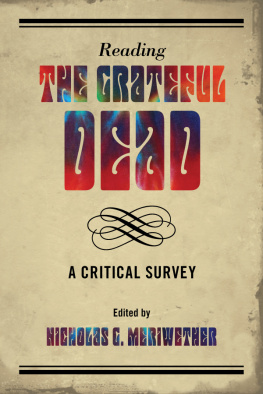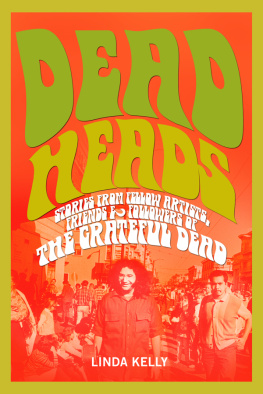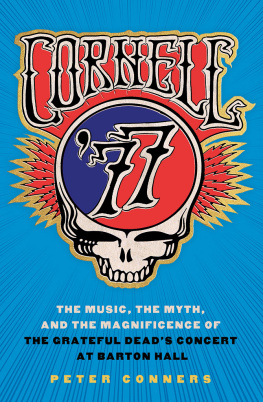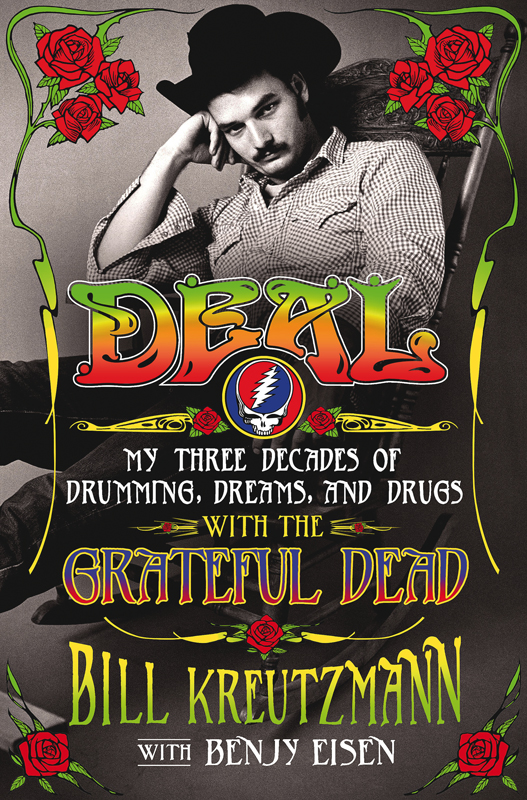Contents
Guide

The author and publisher have provided this e-book to you for your personal use only. You may not make this e-book publicly available in any way. Copyright infringement is against the law. If you believe the copy of this e-book you are reading infringes on the authors copyright, please notify the publisher at: us.macmillanusa.com/piracy.
If I told you all that went down/
It would burn off both your ears.
Deal (Lyrics by Robert Hunter)
Rock n roll was never meant to be institutionalized. When it first came out, it couldnt be contained. It broke every rule and regulation, amendment and guideline. It played by its own set of rules and then it broke those, too. It was supposed to inspire an uprising and fuel the revolution. It was meant to be something your parents feared and your teachers scorned. The very moment that Bill Kreutzmann dedicated his life to rock n roll, his father warned him, Youll never make any money at it. Parents arent always right, you know. That might be the first lesson of rock n roll.
Look: Rock n roll was meant for rebels and revolutionaries. It was meant for outcasts and outlaws, misfits and desperadoes. Thats why it was meant for every kid in America. Thats also why it was the perfect outlet for the Grateful Dead. They may have been seen as subversive in the context of their mid-1960s birth, but even that helped cement their status as the quintessential, All-American Band. They waved that flag. If you bought the ticket, theyd take you on that ride.
Even though they played shows in front of some of the largest audiences of all time, they were still considered an underground phenomenon. Eventually, their secret handshake became so well known that the exclusive became inclusive; by the time Deadheads started proclaimingvalidlythat we are everywhere, the bands insignia had become an international symbol of American counterculture; the David had turned into a Goliath.
But on a small island of the Hawaiian archipelago, two decades after the Grateful Dead disbanded, drummer Bill Kreutzmann lives a pretty normal life. Well normal as far as the hippie lifestyle goes. He lives on an unassuming island property, with cockroaches in the basement and two black LabsIko and Lucyrunning around the yard. Its the kind of house you might go to for a Friday night game of poker with the boys, but it has a few aces up its sleeve, of courselike a gold record stashed behind a pile of stuff in the living room and a Grammy Award on the bookshelf.
It took more than a month of me coming over to Billys house, every day, before I even noticed the Grammy Award. And, sure enough, sharing shelf space with the Grammyand an array of interesting booksis a Rock and Roll Hall of Fame statue. Billy could give a fuck about the statue itself; after all, its just a fabricated object. Its not a totem and it doesnt have magical powers. (If it did, surely he wouldve already tried to eat itor smoke itby now.)
Oh, that? Its a good bookend, he said, almost absentmindedly, when I finally asked him about it one day. We had been up late, drinking, getting high and talking about the days of the Grateful Dead. I understood his point, so I wrote down his response and nodded in agreement; but I didnt forget that, as a teenager, I would sing Scarlet Begonias in the shower before school every morning and daydream about my next Grateful Dead concert. Bill Kreutzmann is in the Rock and Roll Hall of Fame. As well he should be.
When youre with him, its easy to forget the superfluous. He doesnt measure himself by awards or accolades. When we started converting his life story into words on the page, he was never afraid to say things like, We really blew that one! (Woodstock no big deal), or What were we thinking? (the album cover for Go to Heaven).
Rock n roll might be part smoke and mirrors, but the Grateful Dead bored easily of such trivialities. They didnt have synchronized dance moves and they didnt set their instruments on fire. Who they were onstage is exactly who they were when they walked off it.
Rock stars are supposed to be immortal, even after death. The Grateful Deads very existence, however, was fragile from the start. They were infinitely human; it was their music that seemed to come from another dimension entirely. It transcended the earth while grounding you to it, connecting you to everything on the planet all at once. The bands immortality was a result of their rhythms and melodies, not their show outfits and stage banter. They went for what mattered most. It didnt always work and it wasnt always good but when it was, it was better than great. It was a dance with the divine.
Billy was there from the very beginning, before the ragtag group of music-heads that would become the Grateful Dead were even called that. Back then, they were just wild-eyed kids, standing around the back room of a music store in Palo Alto, rubbing two sticks together. But those sticks quickly heated up and caused a spark that caught just enough wind and air to ignite, eventually exploding across the sky like Kerouacs fabulous yellow roman candles. And, when it did, it set the rickety ole house of rock n roll ablaze. It burned down the walls. It turned the ceiling into ashes. It refused to be stuck inside any confined space or time.
Rock n roll, by its very nature, likes to shed its skin every generation or so. But when the Grateful Dead formed, there was nothing there yet to shed. Rock music was still too new. It was always about breaking the rules, but the rules had yet to be written down. So the Dead broke them all.
They didnt play their hits. They barely even had any hits, at least in a traditional sense. They would practice endlessly, but it was impossible to rehearse music thats meant to be in the moment. And although that moment ended, in some ways, in the Summer of 1995, it is still a thirty-year moment that will live on forever. And not just in the minds and in the memories of aging hippies, prep school dropouts, and those lucky enough to have seen the band play live. Already, Grateful Dead music has been passed down to the next generation and it will be passed down to the generation after that. Nobody knows why it endures so persistently, although plenty of other books have attempted to answer that question. This book doesnt even attempt to ask it.
Thats because this is not the story of the Grateful Dead. It does include that bands entire history, in a comprehensive manner that may be more complete than any other book out there. So let me rephrase that: this is not just the story of the Grateful Dead. This is the story of the man who drove the Grateful Deads music forward each night with his beats and with his rhythms. His beats have become all of our rhythms but his stories are uniquely his.
And its a story that took him from poaching deer on the side of Highway 1 in California to living out of a tepee in the Nevada desert under the guidance of a shaman. Its a story of sex, drugs, and rock n roll, sure. But its also a story of cowboys and Indians, a story of cops and robbers, a story of heroes and crooks. Its a story of Northern California in the last half of the twentieth century. Its a story of friends lighting things on fire and racing cars and causing all kinds of trouble in hotels across the world. Its a story of endless renewal. Like any good story, it calls upon the angels of love to sing its chorus. But like any story worth telling, it also wrestles with the demons of loss, who huff and puff the verses like sheets of rain against the walls. Its the story of staying high, if not dry, and of weathering the storm. Of staying the course. Its the story of an extraordinary life well lived, and it is a story that is still far from having an end.


